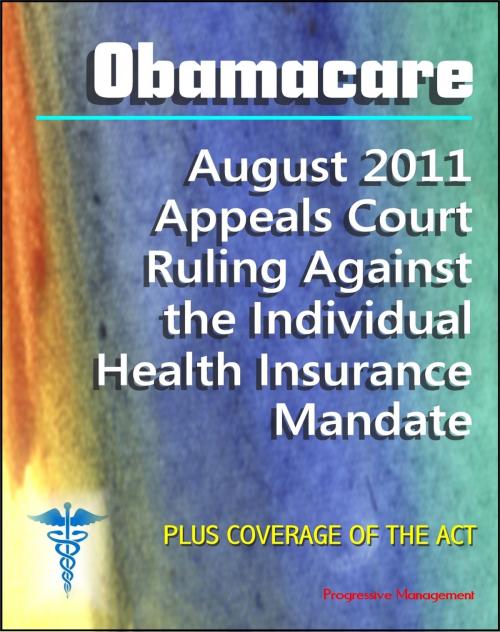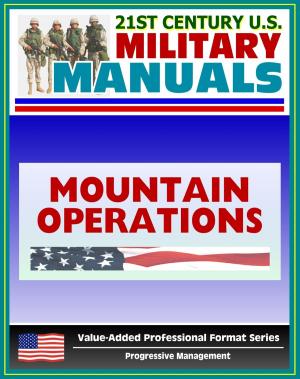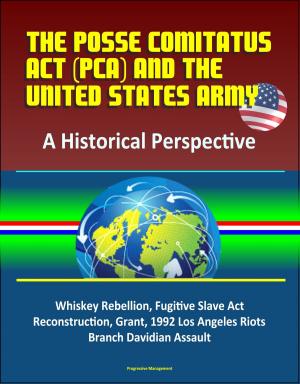Obamacare Patient Protection and Affordable Care Act (PPACA or ACA) - 2011 Appeals Court Ruling Against the Individual Health Insurance Mandate, Plus Coverage of the Act and Implementation
Business & Finance, Industries & Professions, Insurance, Nonfiction, Reference & Language, Law, Constitutional| Author: | Progressive Management | ISBN: | 9781465921222 |
| Publisher: | Progressive Management | Publication: | August 12, 2011 |
| Imprint: | Smashwords Edition | Language: | English |
| Author: | Progressive Management |
| ISBN: | 9781465921222 |
| Publisher: | Progressive Management |
| Publication: | August 12, 2011 |
| Imprint: | Smashwords Edition |
| Language: | English |
The complete opinion of the 11th Circuit of the U.S. Court of Appeals on the unconstitutionality of the individual health insurance mandate contained in the Affordable Care Act, issued on August 12, 2011, is reproduced in this flowing-text format for e-readers. Additional material about the ACA and the implementation of the law is also included.
The court writes:
" With a firm understanding of the Act's provisions, the congressional findings, and the Supreme Court's Commerce Clause precedents, we turn to the central question at hand: whether the individual mandate is beyond the constitutional power granted to Congress under the Commerce Clause and Necessary and Proper Clause. In this Section, we begin with first principles. We then examine the subject matter the individual mandate seeks to regulate, and whether it can be readily categorized under the classes of activity the Supreme Court has previously identified. We follow with a discussion of the unprecedented nature of the individual mandate. Next, we analyze whether the individual mandate is a valid exercise of Congress's power to regulate activities that substantially affect interstate commerce. In this regard, we appraise whether the government's argument furnishes judicially enforceable limiting principles and address the individual mandate's far-reaching implications for our federalist structure. Lastly, we consider the government's alternative argument that the individual mandate is an essential part of a larger regulation of economic activity. We conclude that the individual mandate exceeds Congress's commerce power."
"It cannot be denied that the individual mandate is an unprecedented exercise of congressional power. As the CBO observed, Congress "has never required people to buy any good or service as a condition of lawful residence in the United States." CBO Mandate Memo, supra p.115, at 1. Never before has Congress sought to regulate commerce by compelling non-market participants to enter into commerce so that Congress may regulate them. The statutory language of the mandate is not tied to health care consumption—past, present, or in the future. Rather, the mandate is to buy insurance now and forever. The individual mandate does not wait for market entry.
Because the Commerce Clause is an enumerated power, the Supreme Court's decisions all emphasize the need for judicially enforceable limitations on its exercise. The individual mandate embodies no such limitations, at least none recognized by extant Commerce Clause doctrine."
This is a privately authored news service and educational publication of Progressive Management. For over a quarter of a century, our news, educational, technical, scientific, and medical publications have made unique and valuable references accessible to all people. Our e-books put knowledge at your fingertips, and an expert in your pocket!
The complete opinion of the 11th Circuit of the U.S. Court of Appeals on the unconstitutionality of the individual health insurance mandate contained in the Affordable Care Act, issued on August 12, 2011, is reproduced in this flowing-text format for e-readers. Additional material about the ACA and the implementation of the law is also included.
The court writes:
" With a firm understanding of the Act's provisions, the congressional findings, and the Supreme Court's Commerce Clause precedents, we turn to the central question at hand: whether the individual mandate is beyond the constitutional power granted to Congress under the Commerce Clause and Necessary and Proper Clause. In this Section, we begin with first principles. We then examine the subject matter the individual mandate seeks to regulate, and whether it can be readily categorized under the classes of activity the Supreme Court has previously identified. We follow with a discussion of the unprecedented nature of the individual mandate. Next, we analyze whether the individual mandate is a valid exercise of Congress's power to regulate activities that substantially affect interstate commerce. In this regard, we appraise whether the government's argument furnishes judicially enforceable limiting principles and address the individual mandate's far-reaching implications for our federalist structure. Lastly, we consider the government's alternative argument that the individual mandate is an essential part of a larger regulation of economic activity. We conclude that the individual mandate exceeds Congress's commerce power."
"It cannot be denied that the individual mandate is an unprecedented exercise of congressional power. As the CBO observed, Congress "has never required people to buy any good or service as a condition of lawful residence in the United States." CBO Mandate Memo, supra p.115, at 1. Never before has Congress sought to regulate commerce by compelling non-market participants to enter into commerce so that Congress may regulate them. The statutory language of the mandate is not tied to health care consumption—past, present, or in the future. Rather, the mandate is to buy insurance now and forever. The individual mandate does not wait for market entry.
Because the Commerce Clause is an enumerated power, the Supreme Court's decisions all emphasize the need for judicially enforceable limitations on its exercise. The individual mandate embodies no such limitations, at least none recognized by extant Commerce Clause doctrine."
This is a privately authored news service and educational publication of Progressive Management. For over a quarter of a century, our news, educational, technical, scientific, and medical publications have made unique and valuable references accessible to all people. Our e-books put knowledge at your fingertips, and an expert in your pocket!















